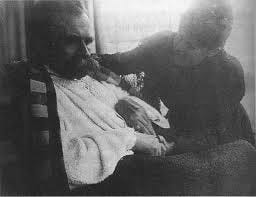P.S. Notes Misused: the Case of Nietzsche and the Nazis
"...here a veritable Hell-machine is at work"
Friedrich Nietzsche (1844–1900) was never one to shy away from controversy, but he would have been appalled by the controversy that has surrounded his writings ever since his death. This controversy centers on his notebooks—specifically, what his sister did with them. For it was Elisabeth, an ardent Nazi supporter, who transformed Nietzsche’s works into fodder for Hitler’s Third Reich.
Nietzsche left behind 106 notebooks. They are gloriously messy things, filled almost completely with Nietzsche’s handwriting that declined along with his eyesight. Elisabeth selectively published a small fraction of Nietzsche’s notes, including those he had clearly abandoned, and called it his magnum opus. She constructed “Will to Power” from hand-picked fragments she carefully pruned to support Germany’s burgeoning National Socialist movement. Through her treatment of her brother’s work, Elisabeth became such a champion of Nazi causes that at her funeral, Hitler sat in the front row.
Because he suffered a total mental collapse in 1889, Elisabeth became Nietzsche’s care-taker and, after his death, his literary executor. And, indeed, Elisabeth did devote much of her life to nursing her ailing brother—a brother who mercilessly slandered her in his final original work, Ecce Homo, where he wrote:
The treatment I’ve been receiving at the hands of my mother and sister, up to this moment, fills me with unspeakable horror: here a veritable Hell-machine is at work, with unfailing certainty over the moment when I can be mortally wounded…1
Did Elisabeth misuse Nietzsche’s notes out of revenge? Or was she just leveraging her brother’s new cult-status to support her social-climbing ambitions? There’s really no way of knowing for sure. What we do know is that the way Elisabeth used her brother’s notes constitutes a blatant abuse of Nietzsche’s Nachlass (or literary remains).
Read on for a closer look at what we actually find in Nietzsche’s notes and how Elisabeth misused them.
These post-scripts offer paid subscribers a deeper dive into the note-takers I cover in Noted’s regular posts. You can read my full post on Nietzsche’s notes here. If you look forward to reading Noted, please consider becoming a paid subscriber. You’ll get additional weekly content, and you’ll help keep this newsletter going!
Keep reading with a 7-day free trial
Subscribe to Noted to keep reading this post and get 7 days of free access to the full post archives.






